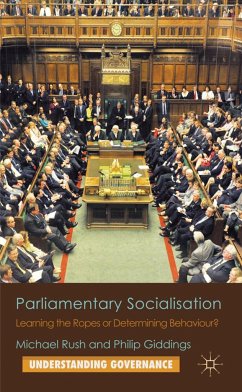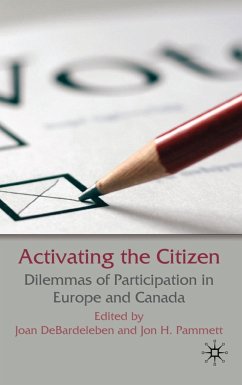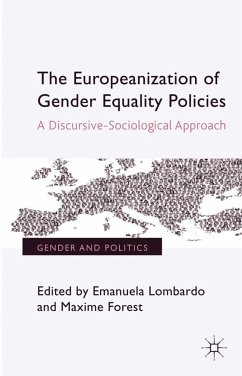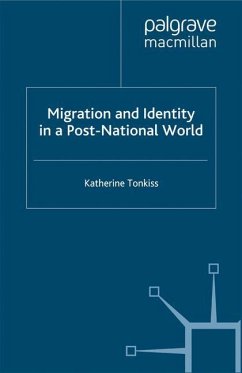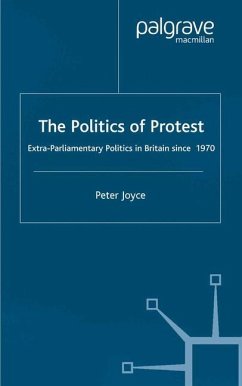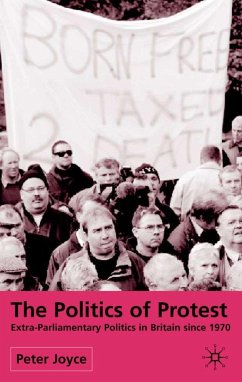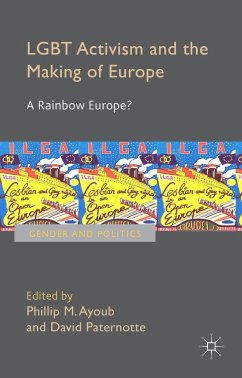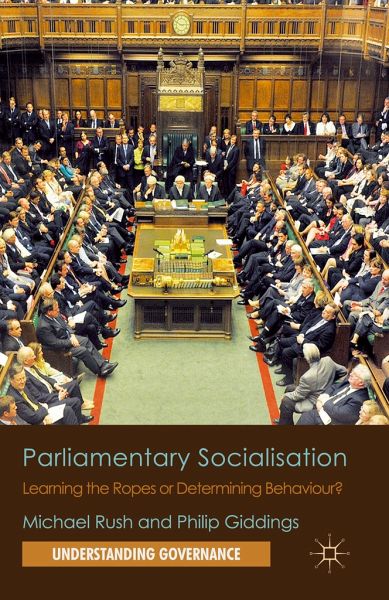
Parliamentary Socialisation
Learning the Ropes or Determining Behaviour?
Versandkostenfrei!
Versandfertig in 6-10 Tagen
Weitere Ausgaben:

PAYBACK Punkte
19 °P sammeln!





This first book-length study of the socialisation of MPs uses questionnaire data gathered over two Parliaments (1992-97 and 1997-2001) to find out how MPs learn about, and what their attitudes are towards, their role as a Member of Parliament. It analyzes their participation in debates, the use of Parliamentary Questions and committee work.
MICHAEL RUSH is Emeritus Professor of Politics at Sheffield University, UK, where he was formerly Head of the Politics Department. He has written a number of books on Parliament, including The Role of the Member of Parliament Since 1868: From Gentlemen to Players (2001), Parliament Today (2005) and When Gordon Took the Helm: the Palgrave Review of British Politics, 2007-08 (with Philip Giddings, 2008). PHILIP GIDDINGS is Senior Lecturer in Politics and Head of the School of Politics and International Relations at the University of Reading, UK. He has edited and contributed to a number of books, including Westminster and Europe: Law, Policy and Parliament (2004), The Ombudsman, the Citizen and Parliament (2002) and Parliamentary Accountability: A Study of Parliament and Executive Agencies (1995).
Produktdetails
- Understanding Governance
- Verlag: Palgrave Macmillan / Palgrave Macmillan UK / Springer Palgrave Macmillan
- Artikelnr. des Verlages: 978-1-349-33007-2
- 1st ed. 2011
- Seitenzahl: 288
- Erscheinungstermin: 1. Januar 2011
- Englisch
- Abmessung: 216mm x 140mm x 16mm
- Gewicht: 366g
- ISBN-13: 9781349330072
- ISBN-10: 1349330078
- Artikelnr.: 45068341
Herstellerkennzeichnung
Springer-Verlag GmbH
Tiergartenstr. 17
69121 Heidelberg
ProductSafety@springernature.com
"The British public were scandalized by the expenses farrago of the last Parliament, together with the ineffectualness of backbench MPs. The Committee on Standards in Public Life during my period as Chairman identified a self-serving culture which had developed over many years under governments of both Labour and Conservative. The 2010 election candidates promised radical change. Have the new intake of MPs the will and capacity to deliver it? This is the crucial question which this fascinating book by Philip Giddings and Michael Rush seeks to answer. It is a must read for anybody interested in the current and future health of our democratic system." - Sir Alistair Graham, Chairman of the Committee on Standards in Public Life from 2004 to
Mehr anzeigen
2007
"After the expenses scandal it is time for attention to turn to what MPs actually do and how they see their role. This is the territory that Rush and Giddings have made their own." - Tony Wright, MP for Cannock and Burntwood 1992-97 and Cannock Chase 1997-2010, former Chair of the Public Administration Committee 1999-2010 and the Select Committee on the Reform of the House of Commons 2008-10
"A welcome feature of the recent public discussion of the ethical behaviour of MPs has been a revival of interest in questioning how Parliament as an institution works, and why its members behave as they do. Parliamentary Socialisation, in its empirical assessment of how MPs' attitudes and behaviour are formed and changed, provides a context to these questions. Although based on research during two periods of majority government, it is essential reading for anyone what wants to understand how MPs are reacting to being members of the first hung parliament since the second world war, and why this is of importance with respect to the type of Parliament we shall have not just at the end of this Parliament's term, but also in the more distant future." - Patricia Leopold, Emeritus Professor of Law, University of Reading, UK
"After the expenses scandal it is time for attention to turn to what MPs actually do and how they see their role. This is the territory that Rush and Giddings have made their own." - Tony Wright, MP for Cannock and Burntwood 1992-97 and Cannock Chase 1997-2010, former Chair of the Public Administration Committee 1999-2010 and the Select Committee on the Reform of the House of Commons 2008-10
"A welcome feature of the recent public discussion of the ethical behaviour of MPs has been a revival of interest in questioning how Parliament as an institution works, and why its members behave as they do. Parliamentary Socialisation, in its empirical assessment of how MPs' attitudes and behaviour are formed and changed, provides a context to these questions. Although based on research during two periods of majority government, it is essential reading for anyone what wants to understand how MPs are reacting to being members of the first hung parliament since the second world war, and why this is of importance with respect to the type of Parliament we shall have not just at the end of this Parliament's term, but also in the more distant future." - Patricia Leopold, Emeritus Professor of Law, University of Reading, UK
Schließen
Für dieses Produkt wurde noch keine Bewertung abgegeben. Wir würden uns sehr freuen, wenn du die erste Bewertung schreibst!
Eine Bewertung schreiben
Eine Bewertung schreiben
Andere Kunden interessierten sich für




